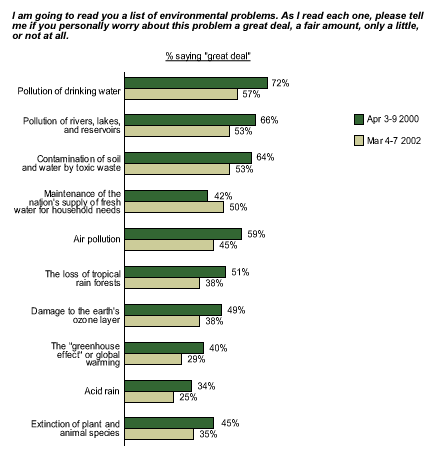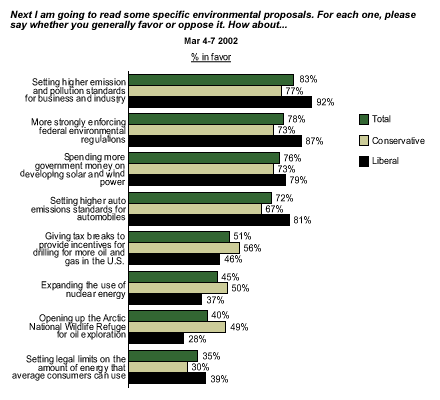As Earth Day 2002 approaches, Americans are faced with two fiercely contested environment-related policy questions -- oil exploration in the Arctic National Wildlife Refuge in Alaska and the proposed storage of nuclear waste at Yucca Mountain in Nevada. The American public's reaction raises a more general question: has the climate of public opinion toward environmental issues changed since the Sept. 11 terrorist attacks and the recent recession forced their way into the national psyche?
In April 2000*, Americans' concern about a list of specific environmental issues was elevated slightly from previous years. Millennial hype had people thinking about the long-term future, and Erin Brockovich, a movie about the real-life woman who uncovered evidence that Pacific Gas & Electric was poisoning the groundwater in Hinkley, Calif., had been released the month before. In January of that year, when the U.S. economy seemed to be having no trouble taking care of itself, 70% of Americans said they would give environmental protection priority over economic growth.
Since the fall of 2001, priorities have shifted. The most recent update shows a majority still favors protection of the environment over the economy, but the percentage favoring the environment has shrunk from 70% to 54%, while the percentage favoring the economy has increased from 23% to 36%. Additionally, when presented with a list of 10 specific domestic problems last month**, the number of Americans reporting they worry a "great deal" about each is down for seven of them since March 2001. The three exceptions can be directly connected to terrorism or the recession: illegal immigration, the economy and unemployment. The number of Americans who say they worry a great deal about "the quality of the environment" has dropped from 42% last year to 35% in 2002.

Since 2000, the biggest drops in those worrying "a great deal" about specific environmental issues are seen for "pollution of drinking water" (72% in 2000, 57% in March 2002), "air pollution" (59% in 2000, 45% today), "pollution of rivers, lakes and reservoirs" (66% in 2000, 53% today) and "the loss of tropical rain forests" (51% in 2000, 38% today).
Have Americans' Attitudes Changed?
Given the drop in concern, can the American public of 2002 be characterized as fundamentally more laissez-faire toward environmental issues? Not really -- as discussed above and in a previous Tuesday Briefing release, Americans' long-standing tendency to say environmental protection should take precedence over economic growth remains intact, and a slight majority of Americans (52%) also say protection of the environment should be given priority over the development of U.S. energy supplies.
Furthermore, Americans' likelihood to express a "great deal" of concern about specific environmental issues isn't necessarily a reliable gauge of the policy stance of most Americans. As last week's column noted, the 50% of Americans who say they "sympathize" with the environmental movement are almost as likely as the 20% who call themselves environmental "activists" to support specific policy proposals, even though they're significantly less likely than activists to say they worry a great deal about environmental issues.
Highest-Rated Environmental Issues
So which environmental policy proposal currently has the broadest support among Americans? "Setting higher emissions standards for business and industry" is a measure favored by 83% of Americans, including 80% of Republicans and 77% of those who say they are conservative.

And the environmental issue that is most worried about? Pollution of drinking water. Though concern about this issue is down 15% from two years ago, a clear majority of Americans still say they worry "a great deal" about it. And that figure is significantly higher among non-whites (75%) and those with annual household incomes below $20,000 (66%), populations that may be most vulnerable to the water pollution. Clearly, Erin Brockovich is still with us.
*Results are based on telephone interviews with 1,004 national adults, aged 18 and older, conducted April 3-9, 2000. For results based on the total sample of national adults, one can say with 95% confidence that the margin of sampling error is ±3%.
** Results are based on telephone interviews with a randomly selected national sample of 1,006 adults, aged 18 and older, conducted March 4-7, 2002. For results based on this sample, one can say with 95% confidence that the maximum error attributable to sampling and other random effects is ±3%.
